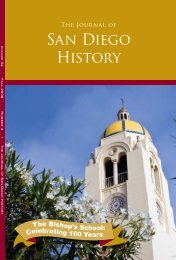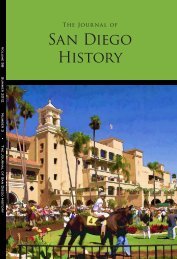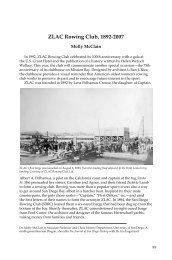Helen D. Marston Beardsley and Progressive Activism - San Diego ...
Helen D. Marston Beardsley and Progressive Activism - San Diego ...
Helen D. Marston Beardsley and Progressive Activism - San Diego ...
Create successful ePaper yourself
Turn your PDF publications into a flip-book with our unique Google optimized e-Paper software.
THE JOURNAL OF SAN DIEGO HISTORY<br />
ture. 31 <strong>Helen</strong>’s experiences differ from her parents <strong>and</strong> siblings in that her volunteerism<br />
reached beyond the local community <strong>and</strong> into the international arena. By all accounts,<br />
<strong>Helen</strong> D. <strong>Marston</strong> <strong>Beardsley</strong> lived an austere life dedicated to ending armed conflict,<br />
providing equitable treatment of laborers, <strong>and</strong> ensuring the provision of adequate<br />
medical services <strong>and</strong> housing to impoverished families. She is not included in the<br />
extensive literature on <strong>Progressive</strong>-era female reformers, with the exception of an<br />
article by peace studies scholar Joan Jensen. Perhaps her private nature would not<br />
allow such a spotlight. Upon her death in 1982, an obituary described the eighty-nineyear-old<br />
<strong>Helen</strong> <strong>Marston</strong> <strong>Beardsley</strong> as “a self-effacing woman who gave few, <strong>and</strong> only<br />
brief interviews,” but during her lifetime she stirred up enough political interest to find<br />
herself on Richard M. Nixon’s “enemies list,” a distinction she found amusing. 32<br />
Born June 26, 1892, <strong>Helen</strong> attended the best schools <strong>San</strong> <strong>Diego</strong> could offer <strong>and</strong><br />
never wanted for material goods. 33 She came of age during the height of <strong>Progressive</strong><br />
debate in <strong>San</strong> <strong>Diego</strong>. 34 The city h<strong>and</strong>ed her father his first political defeat in 1913<br />
when his controlled growth mayoral platform lost to one of development. 35 That same<br />
autumn, <strong>Helen</strong> headed east to enter Wellesley College in Massachusetts, a move that<br />
would dramatically influence the direction of <strong>Helen</strong>’s adult life. Choosing a Wellesley<br />
education hardly represents a break from family tradition as she simply followed the<br />
path forged by her elder sisters who had all attended the prestigious school. 36 But for<br />
<strong>Helen</strong>, the experience catapulted her into <strong>Progressive</strong> reform.<br />
At Wellesley, <strong>Helen</strong> connected with a network of professional women, such as<br />
economist <strong>and</strong> future Nobel Peace Laureate Emily Greene Balch, who guided her pacifist<br />
leanings into a firm belief. 37 <strong>Marston</strong> never had the opportunity to take class from<br />
Balch, but in <strong>Helen</strong>’s memoirs she credited Balch with strengthening her commitment<br />
to disarmament. 38 Joining her parents on a European tour while it was under siege in<br />
1914, she later recognized in her adult years that this trip would “confirm [her]<br />
absorption in problems of peacemaking.” 39 <strong>Helen</strong>’s views began appearing in letters to<br />
her parents, especially those to her father. 40 In a letter to him in February 1916, <strong>Helen</strong><br />
argued that federal money should be directed toward “forming good relations with<br />
Japan, <strong>and</strong> in taking care of the women <strong>and</strong> children in factories <strong>and</strong> so forth, rather<br />
than arming to protect them against an army that we merely assume is coming.” 41 Her<br />
convictions to save federal funding for domestic programs rather than military<br />
expenditures would strengthen throughout her life.<br />
While <strong>Helen</strong> studied in the East, reformers in <strong>San</strong> <strong>Diego</strong> engaged in actions that<br />
influenced pivotal change. Members of the College Woman’s Club (CWC) had been<br />
concerned for several years over the focus on commercial development despite<br />
evidence of growing poverty among <strong>San</strong> Diegans. 42 CWC members believed that city<br />
leaders had long ignored the needs of impoverished families, <strong>and</strong> proceeded to remedy<br />
the situation by using a common progressive tactic: launching a systematic survey of<br />
the city’s social needs. The club voted to charge its Settlement Committee with<br />
“find[ing] a trained worker competent” to survey the city. Recommendations from Paul<br />
U. Kellogg, Survey Editor, <strong>and</strong> Shelby M. Harrison, head of the Department of Surveys<br />
<strong>and</strong> Exhibits for the Russell Sage Foundation, led the group to contract with experienced<br />
reformers Edith Shatto King (a <strong>San</strong> <strong>Diego</strong> native) <strong>and</strong> her husb<strong>and</strong>, Frederick<br />
King.<br />
The Kings had moved to <strong>San</strong> <strong>Diego</strong> in 1909 for Fred’s tuberculosis. Another<br />
reformer <strong>and</strong> long-time friend, Mary Hill, persuaded the couple to help her organize<br />
108




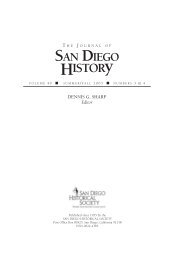
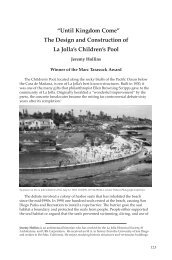
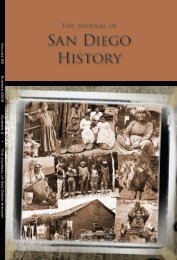
![[PDF] The Journal of San Diego History Vol 52: Nos 1 & 2](https://img.yumpu.com/25984149/1/172x260/pdf-the-journal-of-san-diego-history-vol-52-nos-1-2.jpg?quality=85)
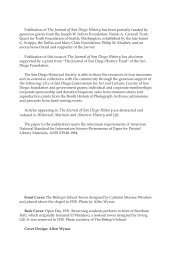
![[PDF] The Journal of San Diego History - San Diego History Center](https://img.yumpu.com/25984131/1/172x260/pdf-the-journal-of-san-diego-history-san-diego-history-center.jpg?quality=85)

